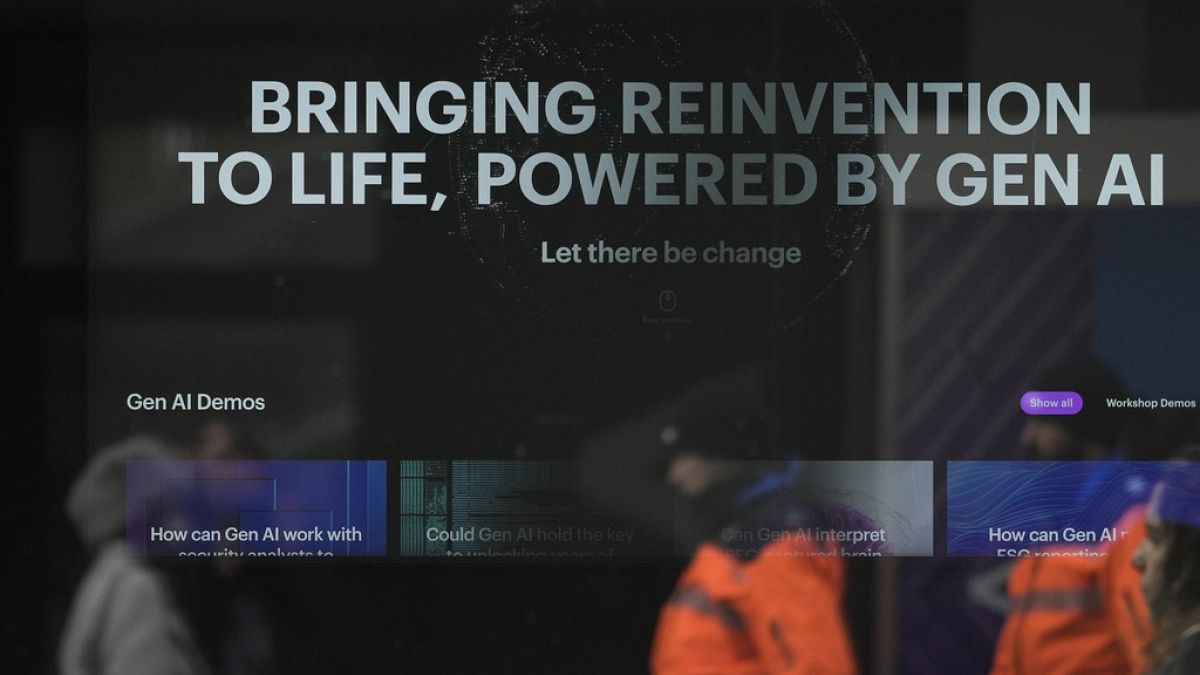One of the key themes that emerged from the recent World Economic Forum in Davos was the increasing potential and associated obstacles related to generative AI.
Euronews Business delves into the subject, exploring the opportunities and challenges that Generative AI presents for Europe.
Definition of Generative AI:
Generative AI encompasses learning models that aid in producing fresh content in various formats as needed. These models are trained on extensive datasets and are crafted to generate top-notch content based on specific prompts. Given the growing popularity of generative AI tools like Chat GPT, Dall E & Claude, the sector is projected to expand at a compound annual growth rate (CAGR) of 32.2%, reaching $53.9 billion (€49.58 billion) by 2028.
Concerns Surrounding Generative AI:
The accessibility of Generative AI with just a click has led to an escalating reliance on this technological marvel.
A survey conducted by Botco among 1,000 marketing professionals from finance, software, and construction industries revealed that 73% of marketing departments utilize generative AI for content creation.
Generative AI offers remarkable opportunities, enhancing customer engagement, boosting productivity, and aiding in various business facets such as product development, risk management, and supply chain optimization. It also plays a role in driving the green business revolution by facilitating data analysis, trend monitoring, and environmental reporting. Additionally, it provides sustainable solutions and a framework for addressing the challenges posed by climate change.
Despite the increasing dependence on Generative AI, prominent members of society and experts express concerns about the safety and privacy implications associated with the content generated.
Potential challenges stemming from the use of Generative AI include the creation of biased content, privacy breaches, copyright issues, reinforcement of existing biases, lack of transparency, and inadvertent disclosure of sensitive information.
Potential and Challenges for Europe in the Realm of Generative AI:
Considering the surge in Generative AI investments across European nations, it is anticipated that investments will spike by approximately 115% in the coming year, reaching €2.57 billion ($2.8 billion). Sectors such as defense, education, technology, automotive, machinery, pharmaceuticals, and healthcare are poised to witness significant impacts from Generative AI.
While some European countries have successfully capitalized on Generative AI, France and Germany lead the continent in terms of expenditure and adoption of this technology.
For Europe, integrating Generative AI in sectors like agriculture, automotive, and technology could yield economic benefits, equipping European enterprises to navigate dynamic market conditions more effectively.
According to a McKinsey report, taking a long-term perspective, Generative AI could drive annual labor productivity growth ranging from 0.1% to 0.6%. With the potential to deliver about 75% of its value, particularly in marketing, customer experience, research and development, and software engineering, Generative AI could foster development, growth, and increased revenue and profits in Europe.
In industries such as banking, healthcare, and sales, Generative AI can automate low-risk tasks outlined in the EU AI Act, such as monitoring, data collection, and reporting. By automating labor-intensive activities, Generative AI can enhance the productivity and efficiency of European enterprises.
Despite the significant experimentation and implementation of Generative AI in Europe, only a small percentage (6%) of companies have reported business value derived from their Generative AI initiatives. France, Germany, and the UK lead the region, with approximately 10% of companies citing value from their Generative AI projects.
The primary challenge faced by European companies concerning Generative AI is the risk of inaccuracies, followed by ethical concerns related to data privacy and security. Ambiguous regulatory frameworks, intellectual property rights issues, and data exploitation attempts further compound the challenges.
Last year, after extensive negotiations, the European Parliament, representing 27 member countries, ratified the EU AI Act, making the EU the first continent to establish explicit regulations for AI usage to ensure safety and security. Although the act offers comprehensive guidelines on the development, deployment, and utilization of Generative AI, it is not expected to be enforced before 2025.
The primary objective of the EU AI Act is to leverage technology for the betterment of humanity, focusing on enhanced healthcare, efficient manufacturing, and sustainable energy utilization. By categorizing risks from prohibited to minimal, the act aims to harmonize technology usage while safeguarding intellectual property rights, ensuring transparency, and protecting data. Noteworthy is the act’s coverage of ethical considerations, including the societal impact of Generative AI, aiming for a more holistic and pragmatic approach.
Given the intricate nature of the European community, it is crucial for Generative AI to foster regional advancement and uphold democratic principles.
The primary emphasis of European countries concerning Generative AI lies in ethical and regulatory considerations, reflecting the region’s commitment to developing regulated and secure AI systems.










